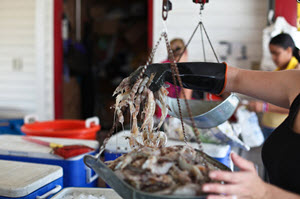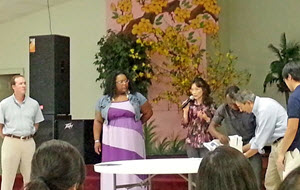
Louisiana Shrimp being weighed before sold. (Photo: Kerry Maloney/Louisiana Seafood News www.Louisianaseafoodnews.com)
Many people outside of the Gulf Coast region are not aware of the large population of Vietnamese residents who live across this area, in concentrated communities from Texas to Alabama.
Arriving as refugees during and after the Vietnam War, they settled along the Gulf Coast to work in the booming commercial fishing industry. Today, the business of catching and processing seafood for sale around the country remains an important economic driver for their community. As a result, the Macondo oil spill profoundly affected the livelihoods of many Vietnamese residents of Louisiana.
In order to address the concerns of this unique community, a joint team of researchers from Tulane University’s School of Science and Engineering and School of Public Health and Tropical Medicine provided information and fielded questions on a Sunday in July at a Vietnamese Catholic church in Houma, Louisiana. Titled, “Is it safe? The Oil Spill, Dispersants, and Frequently Asked Questions,” the event took place after mass with about 20 community members in attendance.

Tulane University held an outreach event on July 21, 2013 at Our Lady of Holy Rosary church in Houma, LA, to address issues related to the oil spill. The church is attended by the local Vietnamese community, many of whom work in the seafood industry. (Photo courtesy of C-MEDS)
Vijay John of Tulane University, Director of the Consortium for the Molecular Engineering of Dispersant Systems (C-MEDS), explained that in order to adequately answer all the questions, it was important that both Schools be represented at the meeting, saying, “The C-MEDS consortium is centered at Tulane University and is in close proximity to the communities that were most directly affected by the Deepwater Horizon incident. In addition, the School of Public Health and Tropical Medicine at Tulane has an extensive research and outreach program on the health impacts of the oil spill.”
Debi Benoit, a Research Board member of the Gulf of Mexico Research Initiative (GoMRI), began the session by explaining the history and mission of GoMRI. Then Vijay John, along with undergraduate students who work with him on dispersant studies, gave brief talks about what dispersants do and why they were used in the oil spill response. Using demonstrations to show the crowd how they worked, the presenters brought up a volunteer child from the audience to shake vials to make emulsions form. Dr. Jeffery Wickliffe, a Tulane toxicologist, ended the talk by explaining the methods researchers used to test seafood for safety.
At the conclusion of the talk, the questions began. “I earn my livelihood shucking oysters. How would I know if the oysters I am working with are contaminated?” “If I develop a skin rash 6 months after working with seafood, where do I go? Who do I turn to?” “My seafood catch is poor. How do I know if it is due to the spill?” “If the state closed certain areas due to contamination, would the water flowing between the closed and open areas not bring oil or other toxic materials into our catches?” And, “Should we be concerned about health hazards even now if we inadvertently come into contact with a contaminant?”
The audience was very polite, but their questions clearly showed that they had concerns about short- and long-term effects of the spill, both on their health and on their ability to provide for their families. The speakers listened with concern, answering questions with the latest scientific research. Dr. Wickliffe fielded quite a few health questions and was extremely helpful in addressing the audience’s concerns. The team also directed the community to organizations and resources that might be a source of ongoing support with health or economic issues. Because of the success of this program, Tulane researchers plan to hold similar events with local community groups in the future as a way of engaging those most affected by the oil spill and sharing their science findings with them.
The Consortium for the Molecular Engineering of Dispersant Systems (C-MEDS) received a research grant from the Gulf of Mexico Research Initiative (GoMRI). The GoMRI is a 10-year, $500 million independent research program established by an agreement between BP and the Gulf of Mexico Alliance to study the effects of the Deepwater Horizon incident and the potential associated impact of this and similar incidents on the environment and public health.
